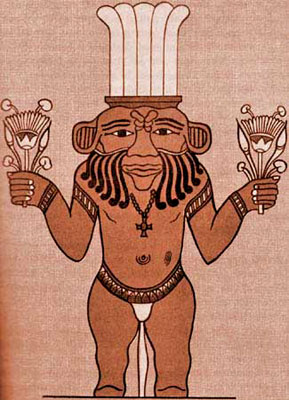|
by Acharya S from FreeThoughtNation Website
In one of the most fascinating books I've ever read, Pygmy Kitabu, Belgian anthropologist Dr. Jean-Pierre Hallet relates numerous detailed legends of the Pygmy people of the Ituri Forest in the Congo, including their origin and savior myths.
Hallet, who spent some 30 years living off and on with the Pygmies, including one 18-month stint completely immersed with the Efé people, relies not only on his own copious firsthand experiences but also the works of other scientists, such as the Jesuit missionary and anthropologist Dr. Paul Schebesta, who likewise lived among and visited the Ituri Forest people for many years from the 1920s to through the 1950s.
As have been others who studied the Pygmies, both scientists were stunned to discover what appeared to be the origins of much biblical and other religious traditions, and both were quite certain that these isolated people were completely uninfluenced by any outside agencies, including christian missionaries.
Indeed, in Pygmy Kitabu, Hallet spends considerable time essentially proving that the Pygmy legends are their own homegrown stories, possibly representing the earliest such traditions still extant anywhere in the world.
Hallet first shows that the Pygmies are certainly one of the oldest races on Earth.
He then demonstrates that their legends and myths are likely the basis of much Egyptian myth, which in turn influenced biblical stories. Hence, there is no need to suppose that the Pygmies were influenced by Bible stories.
In reality, there is absolutely no evidence of any such influence, including and especially in the Pygmy language, which would have reflected biblical intrusions such as the names of "Jesus" and "Moses," etc.
In this regard, Hallet with his colleague Alex Pelle also created an 8,000-word Efé lexicon that reveals some stunning comparisons to various Indo-European languages, including and especially Germanic ones such as Old Norse/Norwegian.
Again, it appears that this old and
isolated people may be the originators of much language as well. Jean-Pierre Hallet with the Efe Pygmies
In the Pygmy religion and mythology, we discover an apparently very ancient account of the "Garden of Eden," as well as a Father God and a mortal savior who overcomes evil.
Moreover, in the Pygmy traditions we also find equivalents to the biblical Exodus story, as well as much Egyptian, Semitic, Indian and Scandinavia mythology.
The Pygmy account of the first man and the "garden" is detailed and reflects Pygmy culture and surroundings, without a hint of any external influence. The extra details, in fact, are indicative of this tale being an original source that was pared down over the millennia, as it passed through various lands and among a variety of peoples.
The
tale is remarkably like the biblical account in germane ways but
clearly not derived therefrom, as the differences prove.
Egyptian Pygmy god Bes with cross around his neck
Another version has God creating the man and woman, and placing them in the forest, where they wanted for nothing.
However, after the woman gets pregnant, she desperately desires the tahu fruit, and forces the man to pick it for her, much to his objection.
Angered, God says:
In the Pygmy origins legend, we find,
As noted, this story is detailed in ways absent from the biblical version, contains language and imagery appropriate for a Pygmy setting, and reveals no intrusions from external influences whatsoever.
There is no reason to suspect that the Pygmy "Garden of Eden" story is anything but original, and there is much reason to suggest it may well be the oldest account we possess - and the first. What this development suggests, of course, is that the biblical account did not originate in the Middle East and was not originally handed down to Semitic "chosen people."
The same can be said for other biblical
myths, such as the Exodus and Christ stories, both of which appear
to have emanated from the same Pygmy source as well.
Note also that the Pygmies are perpetually abused and endangered, and are in desperate need of assistance.
For humanitarian reasons, as well as
that they may well represent the oldest source of various
linguistic, religious and mythological ideas, we need to
help protect the Pygmies and
preserve their culture!
|


